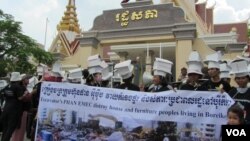PHNOM PENH —
Economic land concessions remain a major concern, with more than 230 people arrested in 2012, an increase of more than 150 percent from the year before, according to an annual report by the rights group Adhoc.
As of December, 38 of those people were still in prison, the group reported. At the same time, the government has granted or set aside around 2 million hectares of land in all, with about 380,000 hectares awarded in 2012 alone, the group said.
Whereas 2011 saw a “sharp increase” in economic land concessions, or ELCs, granted by the government to private companies, Adhoc said in the report, “in 2012, conflicts became more acute, and protests multiplied. The government showed that it had understood the seriousness of the situation by taking initiatives aimed at resolving land disputes, addressing some of the issues related to ELCs and granting thousands of land titles to rural families."
“However, some of the most pressing concerns about the overall pressure on land, landlessness, land tenure insecurity, lack of law enforcement, power abuses, and encroachment on livelihoods and natural resources remained unaddressed.”
That means land conflicts have increased, Thun Saray, president of Adhoc, told VOA Khmer. The government issued 66 directives setting aside 381,121 hectares of land in 2012, he said. That’s an increase of about 16.7 percent from the year before, he said.
Thirty-three of those concessions were granted after the announcement by Prime Minister Hun Sen that he was putting a moratorium on concessions, Adhoc said.
“An ever-increasing percentage of the Cambodian population is landless,” the Adhoc report said. “Successive land titling programs have failed to address the needs of the Cambodian citizens who are most in need of land tenure security, i.e., those who live in informal settlements and disputed areas, as well as indigenous people. The question now is, where will Cambodia find enough land for the next generation, given that almost half the arable land is in the hands of private concessionaires, leased for up to 99 years?”
Government spokesman Phay Siphan said the report did not provide enough evidence to support its findings. “Local NGOs have not followed up on government land concession cases,” he said.
As of December, 38 of those people were still in prison, the group reported. At the same time, the government has granted or set aside around 2 million hectares of land in all, with about 380,000 hectares awarded in 2012 alone, the group said.
Whereas 2011 saw a “sharp increase” in economic land concessions, or ELCs, granted by the government to private companies, Adhoc said in the report, “in 2012, conflicts became more acute, and protests multiplied. The government showed that it had understood the seriousness of the situation by taking initiatives aimed at resolving land disputes, addressing some of the issues related to ELCs and granting thousands of land titles to rural families."
“However, some of the most pressing concerns about the overall pressure on land, landlessness, land tenure insecurity, lack of law enforcement, power abuses, and encroachment on livelihoods and natural resources remained unaddressed.”
That means land conflicts have increased, Thun Saray, president of Adhoc, told VOA Khmer. The government issued 66 directives setting aside 381,121 hectares of land in 2012, he said. That’s an increase of about 16.7 percent from the year before, he said.
Thirty-three of those concessions were granted after the announcement by Prime Minister Hun Sen that he was putting a moratorium on concessions, Adhoc said.
“An ever-increasing percentage of the Cambodian population is landless,” the Adhoc report said. “Successive land titling programs have failed to address the needs of the Cambodian citizens who are most in need of land tenure security, i.e., those who live in informal settlements and disputed areas, as well as indigenous people. The question now is, where will Cambodia find enough land for the next generation, given that almost half the arable land is in the hands of private concessionaires, leased for up to 99 years?”
Government spokesman Phay Siphan said the report did not provide enough evidence to support its findings. “Local NGOs have not followed up on government land concession cases,” he said.
